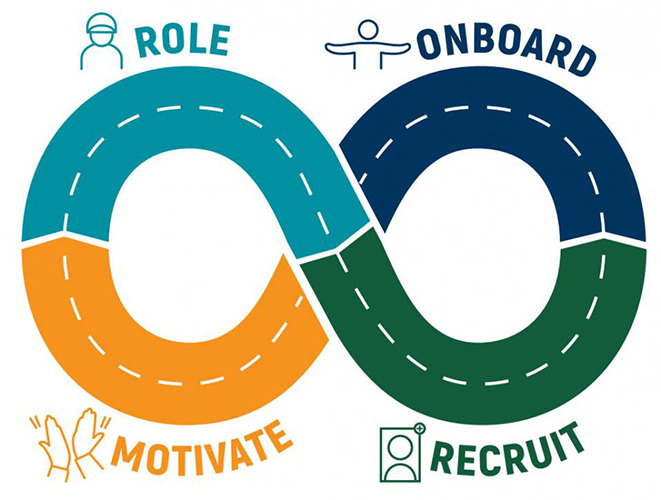Evidence-based support for recruitment and retention of volunteers is an important part of strengthening Australia’s emergency services workforce capability. A new toolkit is supporting leaders in the way they recruit, onboard, manage and retain volunteers.
When a natural hazard strikes or an emergency arises, communities rely on the assistance provided by emergency services personnel, many of whom are volunteers. This puts pressure on not only the volunteers, but also on their leaders; many of whom are not trained as managers when they become a volunteer leader.
Ensuring that volunteer leaders are as well-supported as possible in areas of training, recruitment, management and staff retention is essential to deliver crucial emergency services. Research in this area has recently focused on improving the resources provided to emergency services organisations.
Improving the way volunteers are led
Jennifer Pidgeon is the Manager of Strategic Volunteer and Youth Programs at the Department of Fire and Emergency Services (DFES) in Western Australia. DFES manages 26,000 volunteers across 800 brigades, groups and units (BGUs) within 5 volunteer emergency services. With a jurisdiction of more than 2.5 million square kilometres, Western Australia is one of the world’s largest emergency response areas.
Ms Pidgeon explained that volunteer leaders are identifying that changes in the social and economic conditions in Western Australia, compounded with the changing nature of emergencies related to environmental change, require new approaches to recruiting and retaining volunteers. Volunteer leaders are seeking more support to improve their effectiveness and ability to meet the needs of volunteers and the community.
‘Volunteer management and recruitment is complex. The drivers are different to any paid work.
‘Our volunteer leaders are seeking assistance in the retention and recruitment space. We need to provide some sort of resource that can support our brigades, groups and units to meet volunteer needs. We also need to find a way to present what is quite complex management theory to an audience with potentially no background in the area,’ Ms Pidgeon said.
A toolkit for volunteer leaders
Researchers at Curtin University and the University of Western Australia, through the Bushfire and Natural Hazards CRC, worked with DFES to develop an evidence-based Recruitment and Retention Toolkit for Emergency Volunteer Leaders, which is available online.
The toolkit was one of the outputs of the Bushfire and Natural Hazards CRC project, Enabling sustainable emergency volunteering. This project examines volunteer engagement, motivation, wellbeing and psychological perceptions and, using this knowledge, designs better recruitment, retention and wellbeing actions and materials for emergency services organisations to use.
The toolkit is grounded in relevant models of organisational psychology and researchers worked with leaders and volunteers of brigades, groups and units to ensure the resources were as useful and easily applicable as possible.
CRC researcher Associate Professor Patrick Dunlop from the Curtin University Future of Work Institute explained that while the toolkit has psychological foundations, it was important that researchers design resources that would support volunteer management.
‘We wanted to go back to basics and understand what relevant theories from psychology are likely to apply to these sorts of volunteer settings.
‘We consulted with volunteers directly, their leaders across all services, district officers at DFES and the partner associations and their leaders. And we often discovered that the very best way of doing these things, like recruiting and onboarding, were already being done by a group and it’s just that nobody else knew about it,’ he said.

A volunteer recruitment and retention roadmap improves the effectiveness of activities and materials used by volunteer leaders.
Source: Department of Fire and Emergency Services, Western Australia
The toolkit gives leaders access to highly relevant, evidence-based new resources such as checklists, tip sheets, sample booklets and editable templates. These products assist at all stages of volunteer management:
- Recruiting Volunteers for the Emergency Services: a resource supporting volunteer recruitment and messaging.
- Volunteer Role Descriptions: a guide on role descriptions, why they are important and how to complete them.
- Managing Volunteers in the Emergency Services: a resource on how to motivate and manage emergency service volunteers effectively.
- Volunteer Succession Planning: currently under development.
Associate Professor Dunlop and Hawa Muhammad Farid, alongside Jennifer Pidgeon and Kate White from DFES, introduced the toolkit to leaders of brigades, groups and units in an online showcase hosted by the Bushfire and Natural Hazards CRC in October 2020. They guided the audience through some of the tools that are currently being used by DFES in their volunteer recruitment and retention activities.
Collaboration is important
Strong collaboration was important in the development of the toolkit. This brought together the emergency management expertise of the DFES, the research knowledge of Curtin University and the University of Western Australia, as well as the personal experiences of volunteers and volunteer leaders.
Ms Pidgeon said that this hands-on collaboration was essential in creating the resources.
‘What was important to us was that the volunteers and people who lead were actively consulted and engaged with when developing these resources. The benefits we can get from the relationship with researchers and actual application of current knowledge is that we have a useable and very useful resource for our volunteers.
‘By building the relationship we’re able to see a bigger picture of what’s happening in our volunteer workforce and develop and build a resource set that meets their needs. But the long-term relationship with this particular research team means we’re able to create a holistic picture and they have a very good grounding in what is happening with our volunteers, as well as the broader volunteering environment,’ she said.
The research that contributed to the toolkit is being used by DFES on their Volunteer Hub.
The CRC Enabling sustainable emergency volunteering project, alongside other science on the topic of people and capability, is examining what the emergency volunteer workforce will look like in 2030 so that we can plan for a strengthened volunteer base.


